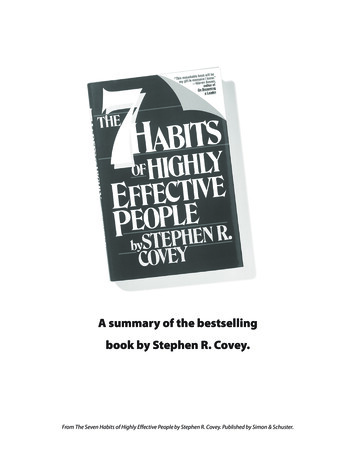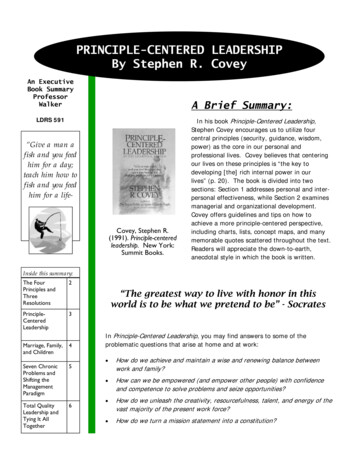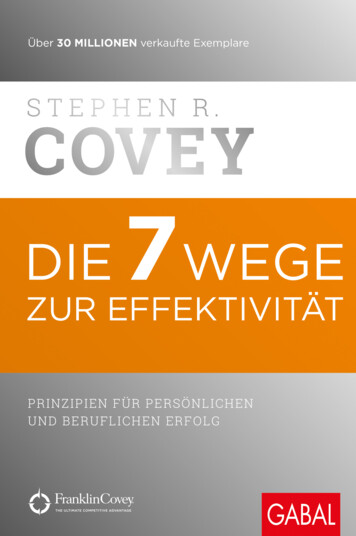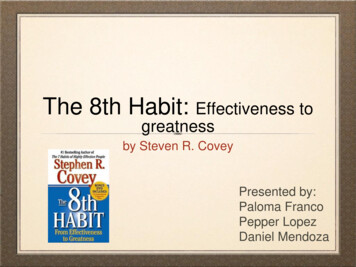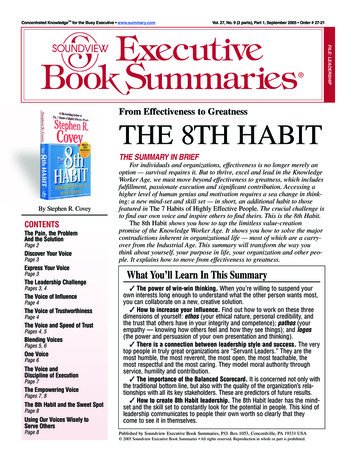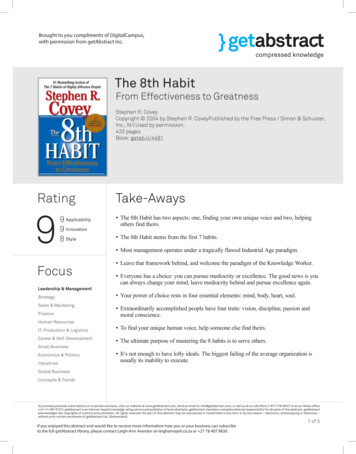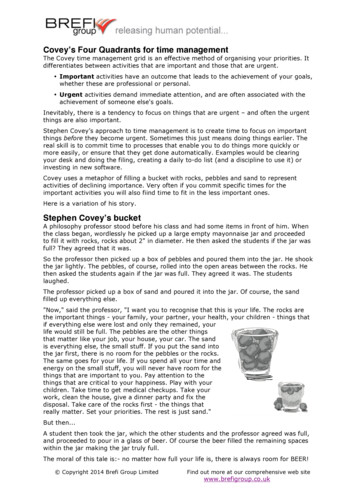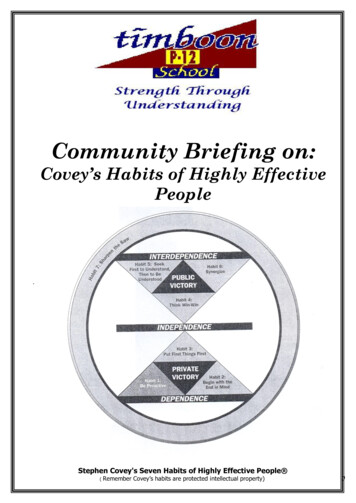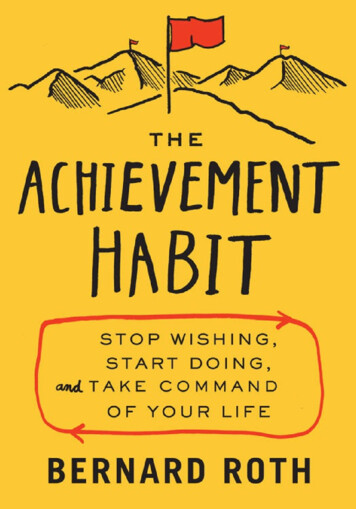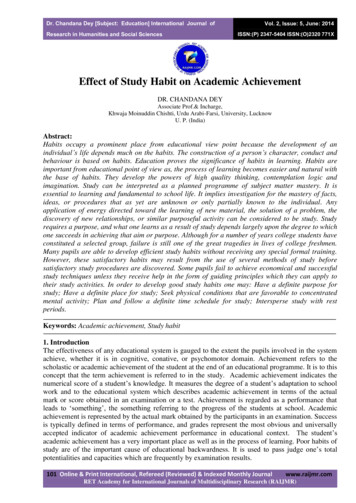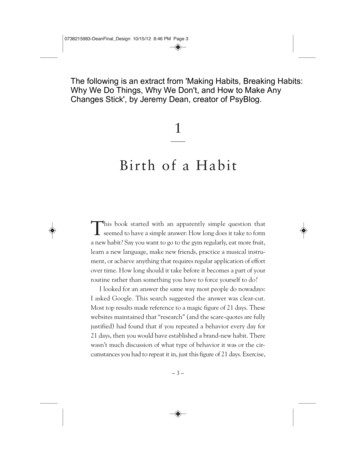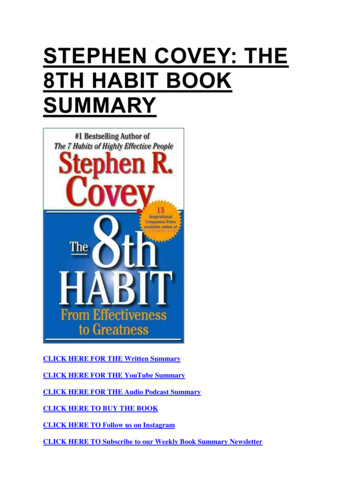
Transcription
STEPHEN COVEY: THE8TH HABIT BOOKSUMMARYCLICK HERE FOR THE Written SummaryCLICK HERE FOR THE YouTube SummaryCLICK HERE FOR THE Audio Podcast SummaryCLICK HERE TO BUY THE BOOKCLICK HERE TO Follow us on InstagramCLICK HERE TO Subscribe to our Weekly Book Summary Newsletter
BOOK SUMMARY: WHAT’S IN IT FOR ME? LEARNHOW TO BE THE GREATEST YOU IN YOURWORK.Consider your own voice. Not your singing voice or your speaking voice, but your voice –the significance, the endless potential and greatness of you. Have you found it?Finding your voice at work, whether you’re a regular employee or a top leader, is notnecessarily easy. And if you’ve already managed to find it, there’s still no guarantee thatyou’ve managed to consistently use it. In The 8th Habit, the author gently pushes you tofind your voice. He fills you in on how to take action and find it, and, importantly, how toinspire the people around you to find their voices as well. In this book summary, you’ll discoverhow to develop the four intelligences that’ll help you find your voice;that freedom of choice allows you to unfold your true potential; andthe key to building mutual trust.SUMMARY PT 1: THE 8TH HABIT IS ALL ABOUTFINDING A WAY TO GREATNESS IN TODAY’SINFORMATION/KNOWLEDGE WORKER AGE.Ever feel like you don’t make much of a difference? Or that what you do doesn’t reallymatter? Many people seem to feel this way. But why?Well, many organizations can’t keep up with the constant changes of our modern world.And therein lies the problem.We currently live in the Information/Knowledge Worker Age, the successor of theIndustrial Age. Many organizations find it difficult to accommodate the shiftingapproaches to work that this new era gave rise to, and they still operate with anIndustrial Age mindset, governed by a domineering top-down style.This kind of control functions poorly in the current age, which is all about unleashingthe potential of our workers.Consider the value of quality in today’s IT industry. An outstanding programmer, forinstance, is 1000 times more productive than an average programmer. During theIndustrial Age, such disparities between individual levels of productivity wereimpossible.
It’s therefore necessary to abolish the controlling top-down approach, as it limitsemployee potential. We must produce the kind of quality we expect of today’sbusinesses.Most importantly, employees should be encouraged to find their own voice.Everyone wants to be great at their job, but only those who find their voice and make ahabit of using their strengths can enjoy true success. Finding that inner voice is knownas the 8th habit. So how do you do it?It starts with treating employees respectfully so that they can make their own choices,use their creativity and feel significant in their workplace. Everyone must be able to findtheir own voice and, in turn, inspire others to find theirs.SUMMARY PT 2: YOU CAN FIND YOUR VOICE BYUSING THE GIFTS YOU WERE GIVEN AT BIRTH.Did it ever occur to you that your greatest gift is your freedom of choice? Each of us isborn with this freedom, along with the gifts of intelligence. The combination of thesegifts equips us to find our own voice.Freedom to choose is precious. While we can’t always control what happens to us,we can always choose how we react to life’s challenges. When used wisely, you can useit to broaden your horizons and regain control of your life.The principle of freedom is applicable to every part of your life, including your work.For example, if your boss is treating you like a doormat, do something about it! It’s easyto forget that you have the power to choose how you react – but you do. So, why notchoose to talk to your boss directly about it?Now let’s look at the gifts of intelligence.There are four kinds of intelligence, each of which we can improve and cultivate. Byworking on your intelligence, you’ll discover your strengths, and that discovery willguide you to your voice.Physical intelligence allows our body to function and regulate itself without ourconscious input. An example of this would be our heartbeat.Mental intelligence is our ability to think abstractly and analyze things, people andsituations.Emotional intelligence enables us to empathize, so that we can communicate with andrelate to others in an effective, friendly way.
Finally, spiritual intelligence is something most people don’t spend much time thinkingabout, but is of great value nonetheless. In fact, it’s the very basis of the other forms ofintelligence; it’s the true north of our moral compass, the imperative that drives us toseek meaning in life.SUMMARY PT 3: TO LEAD IS TO INSPIREOTHERS AND HELP THEM FIND THEIR OWNVOICE.Think about the leaders and managers in your organization. Are they effective? Are youyourself a good leader? Every organization has leaders – and yet, as we all know, someare far better than others. What exactly is it, then, that makes a good leader?A good leader is able to play not one but four leadership roles.If you’re a leader who wants to help others find their voice and recognize their ownpotential, you must lead your employees, ratherthan managing and controlling them. Doing this is central to any leader’s purpose.Filling the four roles listed below will get you well on your way.First, you’ll need a vision and strategy that establishes a direction for your employees.Second, you’ll need to set an example by executing your own ideas in a disciplinedfashion. Third, be passionate about what you do so that through your enthusiasm youcan establish a shared organizational culture. Finally, you should be able to manage andmaintain structures inside your organization.Now you’ve started down the path of leadership, but to become a truly great leader, youmust also enlist your four intelligences.We employ our intelligences in order to achieve individual greatness; a leader shouldapply the same paradigm to her company, a tactic that will make many commonproblems disappear. Think of the four intelligences as body parts of the company: if oneis missing or neglected, it will undermine the structure as a whole.Imagine a company that ignores the need for spirit – something like a sharedorganizational culture, for example. A dearth of communal spirit could lead to a lack oftrust, which in turn could mean that some employees feel totally excluded and alone.SUMMARY PT 4: DON’T JUST SIT AROUND ANDWAIT FOR YOUR OLD HABITS TO CHANGE. DOSOMETHING ABOUT IT.
Do you ever think, “I’m sure things will get better soon. I’ll just have to wait and see”? Ifso, you’re not the only one. It’s not uncommon for us to sit around and wait for change.But things rarely change in this way. And as you have the freedom to choose, you’re inthe perfect position to rectify your attitude!In order to discover your voice, you must choose to change your motto so that “wait andsee” becomes “take action.”Picture, for instance, that you despise your job because your boss is a total control freakand rejects all the ideas you have. You consider quitting; however, you can’t afford tolose your job. So you decide to just grin and bear it from Monday to Friday.But there is another way.You could acknowledge that you’re not a victim. You have a choice. The vast majority ofthe time, you can choose to change something about your situation. All it takes is someinitiative and responsibility. When you adopt this mindset and start using your voice,you’ll see that even if your boss is your leader in a formal sense, you still have the powerto make a real difference in your own job.If something is really out of your hands, though, you can decide how to react to thesituation. Sure, there are certain external things that you just can’t control or influence.Say, for example, that your boss wants to hire someone who rubs you the wrong way,but your job position doesn’t allow you to interfere with hiring decisions. Even in caseslike these, you can still choose not to let it bring you down. And if there in fact issomething you would like to change and that clearly is part of your role, then take thereins and do it!SUMMARY PT 5: MUTUAL TRUST IS THE KEY TOPERSONAL AND BUSINESS RELATIONSHIPS.You’ve heard it before – but for good reason: if you want to be successful, it’s not onlyabout having talent and drive but about who you are as a person. And a large part ofhow you measure up as a person is your ability to inspire trust in others.But how do you ensure that people trust you professionally and personally? By stickingto your word, being friendly and knowing when to say sorry.The following simple rules will help you do these things. Once you start doing themconsistently, you’ll soon see what a positive impact they have.First, be sure to always make good on your promises. If you are not 100 percent sureyou can deliver, don’t make a promise! Failing to follow through is the quickest way tolose other people’s trust.
Next, being kind and friendly to others – simply saying “thank you,” “please” and asking,“can I help?” – can make all the difference. Also, watch your words about people who arenot in the vicinity, as gossiping is toxic and detrimental to instilling trust. Instead, usewarm and friendly words. It will go a long way.Furthermore, being able to say sorry is also incredibly impactful; a genuine apology canearn you back whatever trust you’ve lost in your less-than-admirable moments.Remember, though, that trust is not a one-way street. Sometimes all you need to do istrust another person. In fact, the verb to trust nicely sums up what you’re trying to dowhen you attempt to help others find their voice. If you genuinely trust someone, youshow them that you notice their potential and their value. Granting them this trust willshow them their own potential, too.Building a foundation of trust and trusting others in your work and personal life willimprove all of your relationships. And the great thing is, it’s not hard: it just takes a bitof effort.SUMMARY PT 6: BEING ABLE TO COMPROMISEIS IMPORTANT WHEN DEALING WITHCONFLICTS.Think of the last time you tried to resolve a conflict with someone. How did it go? Didyou talk incessantly at each other or did you try to understand your interlocutor’sperspective first?It’s sometimes easier said than done, but the best way to quell a conflict is to truly listento the other person.Most of us think we’re already pretty good at listening because it feels like we do it allthe time. However, there is a big difference between listening as we usually doand empathetic listening.Say you’re trying to decide on a logo for your project and your colleague is presentingtheir point of view. In order to really listen, try to see what your colleague is seeing andwhy they are seeing it that way. Try to perceive it from within your colleague’s frame ofreference.It’s useful to bear in mind that conflict and misunderstandings are often caused bydifferences in semantics. All of us have our own way of using words and even a singleword can hold different meanings and connotations for different people. Therefore, tobetter hear and understand your colleague, try to grasp what they mean when they useparticular words.
After you’ve truly listened to your colleagues’ idea, you can begin explaining your pointof view and looking for a third alternative that fits for both of you. After both partieshave offered their view, an ideal solution might simply crop up, as the conflict may haveonly arose because you didn’t understand the other person properly.Sometimes, however, a compromise is necessary. This doesn’t mean that one side loses;rather, there should be mutual understanding and open-mindedness, the natural resultof talking to one another and understanding differing opinions. This will make a thirdalternative far more palatable – maybe even make it the best solution from allperspectives.SUMMARY PT 7: ALL ORGANIZATIONS SHOULDHAVE A CENTRAL VALUE SYSTEM THATEMPLOYEES CAN ALIGN THEMSELVES WITH.What’s it like in your company? Do all the workers know the core values of theorganization? Are they aligned with them? If you’re a leader and can’t answer yes tothese questions, your company might be suffering.If your employees aren’t familiar with the organization’s core values, it’s very likely thatthe business itself stands on a shaky foundation.For example, imagine asking the CEO of a company about the values of her organization.She might mention that cooperation is a key tenet. Maybe there was even a companytraining that aimed to help employees cooperate more frequently and in a better way.But workers within the company don’t seem to cooperate all that well. Upon closerinspection of the issue, you may discern that although the company’s core value iscooperation, there’s also a great deal of competitiveness, caused by a reward system fortop performing employees. And these two values work against each other.This kind of approach makes for serious misalignment and confuses employees. Someemployees might opt for cooperation because it makes them happier and more efficient;others may choose to be competitive because it pushes them to achieve better resultsand promises rewards.So how do you deal with this as a leader? Start giving feedback to ensure that youremployees are aligned with the company’s values.Not a single person or organization is on track all the time, so don’t fret. Don’t punishyour employees for this, but provide feedback that helps them get back on target andachieve the desired goal.
For instance, how about arranging a monthly team meeting? This would give you anopportunity to let your employees know what you appreciated that month, as well aswhat could be improved. It will give your employees the chance to offer feedback, too.SUMMARY PT 8: EMPOWER YOUR EMPLOYEESTO FIND AND USE THEIR PASSION AND TALENT.Who controls the planning and evaluation of tasks in organizations? The leaders, right?This is often the case. But if leaders run an overly tight ship, they often do more harmthan good, b
as the 8th habit. So how do you do it? It starts with treating employees respectfully so that they can make their own choices, use their creativity and feel
